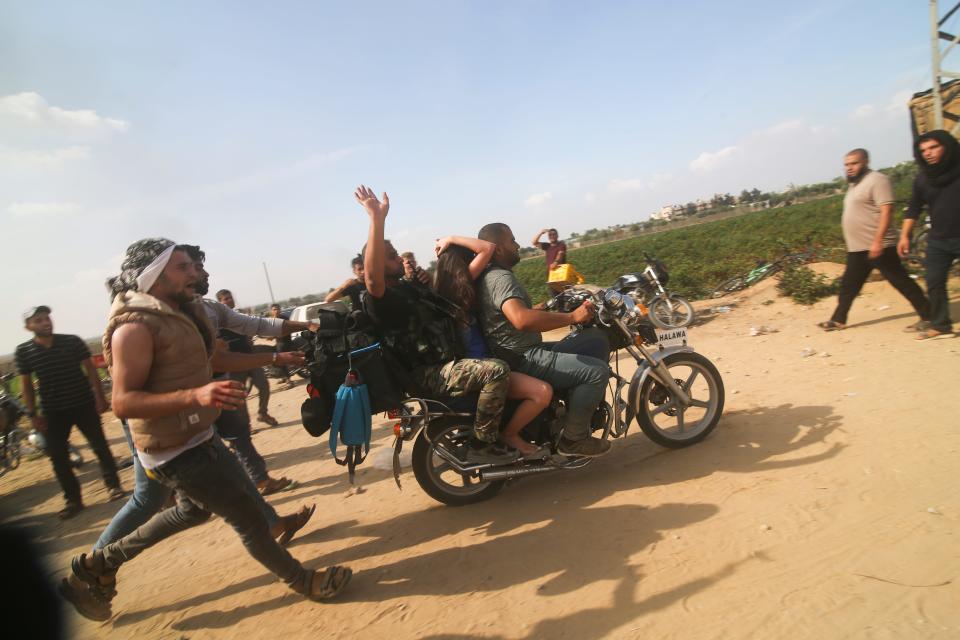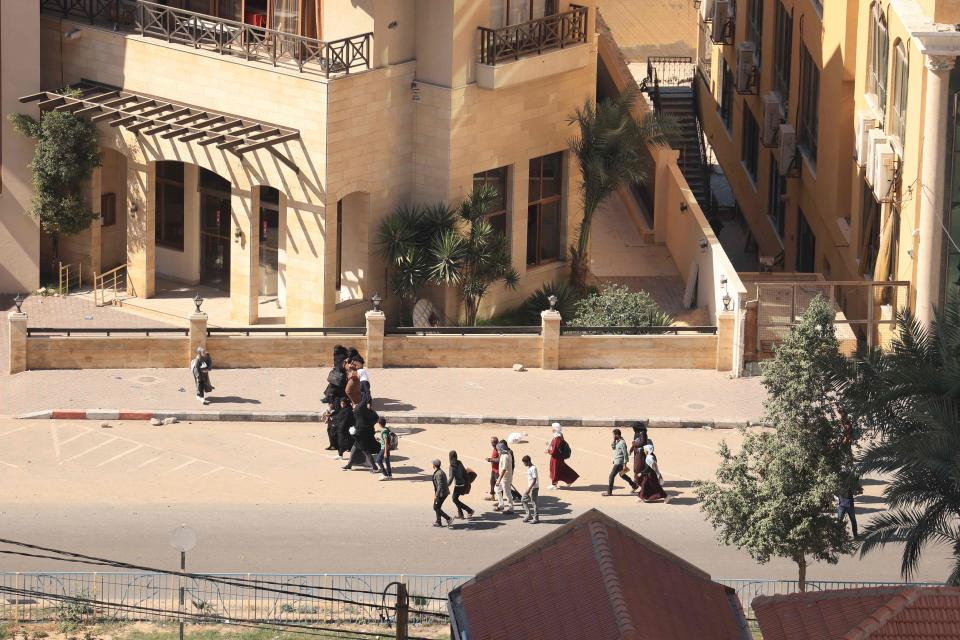How to talk to your kids about images of violence on social media: Schools offer guidance
When disturbing images of war are delivered to the palm of your child’s hand, what’s a parent to do?
It’s the question that was raised everywhere last week, because grisly videos and photos from the war in Israel were everywhere: on TikTok, Instagram, what used to be Twitter, the news.
Early in the week, there were videos of missiles heading for targets in Israel, of Israelis pleading for their lives as they were taken hostage. Then the stories of families who had been slaughtered by Hamas terrorists. And Palestinian families killed and displaced by shelling.

By week's end, social media warned of grisly hostage videos to come, of impending attacks elsewhere. While the FBI identified no concrete threat against targets in New York, nerves were rattled further. Police stepped up their visibility at schools across the Lower Hudson Valley.
‘Troubling, traumatic’ images spread on social media
Schools in our area scrambled to respond. Some superintendents, including Irvington’s Joel Adelberg, got ahead of the issue, emailing his community on Monday, when students were off for Indigenous People’s Day. He wanted to prepare students, parents and faculty for the week ahead.
"We know that knowledge of what occurred and what is continuing in the Middle East is troubling to all of us, and for many of our students the images they have been seeing and the stories they have been hearing are especially troubling and even traumatic," Adelberg wrote Monday.
The interim superintendent wrote that counselors would be at the ready, administrators would visit classrooms and parents should alert schools if their child was struggling. He added that he trusted Irvington's teachers to facilitate classroom discussions "that emphasize respectful discourse, evidence-based critical exploration of ideas, and that are developmentally and age appropriate."

Adelberg, in an interview on Thursday, said he felt it was vital to send a clear message to a community whose members have family in the Middle East, as do many across our region.
“We know what we're all watching unfold and the district is ready to do what schools are supposed to do: to take care of our kids, to take care of each other, to create a safe space for kids to be OK with however they feel, to know that they're going to be supported by their teachers and our clinicians and our administrators, that we will have all eyes on all kids all day. And we have all week.”
Adelberg said schools had to help students navigate the confusion and stress created by all those images.
“I also wanted to let people know that schools are where we talk, that's where we unpack, that's where we deal with sometimes challenging and difficult information to comprehend,” Adelberg said. “School is the place to do that. And I wanted to reassure them that we have a staff that knows how to do that.
“We're not going to force kids into conversations that they're not ready to have. We know how to be developmentally appropriate. We know how to read a room.”
Adelberg did what superintendents across the region did: He gave parents resources to talk to their children about what they were seeing.
He directed parents to a UNICEF guide titled "How to talk to our children about conflict and war," which begins: "When conflict or war makes the headlines, it can cause feelings such as fear, sadness, anger and anxiety wherever you live. Children always look to their parents for a sense of safety and security — even more so in times of crisis."
8 tips for talking to children about war
Here are UNICEF's 8 tips for parents when talking to their children about war. The complete guide is at www.unicef.org/parenting/how-talk-your-children-about-conflict-and-war.

Find out what they know and how they feel. “Choose a time and place when you can bring it up naturally and your child is more likely to feel comfortable talking freely, such as during a family meal. Try to avoid talking about the topic just before bedtime.” Focus on listening to them, not explaining.
Keep it calm and age-appropriate. “You know your child best. Use age-appropriate language, watch their reactions, and be sensitive to their level of anxiety. It is normal if you feel sad or worried about what is happening as well. But keep in mind that kids take their emotional cues from adults, so try not to overshare any fears with your child. Speak calmly and be mindful of your body language, such as facial expressions.”
Spread compassion, not stigma. “Conflict can often bring with it prejudice and discrimination, whether against a people or country. Avoid labels like ‘bad people’ or ‘evil’ and instead use it as an opportunity to encourage compassion, such as for the families forced to flee their homes.”
Focus on the helpers. “It’s important for children to know that people are helping each other with acts of courage and kindness. Perhaps they could draw a poster or write a poem for peace, or participate in a local fundraiser or join a petition. The sense of doing something, no matter how small, can often bring great comfort.”
Close conversations with care. “As you end your conversation, make sure you are not leaving your child in a state of distress. Watch their body language, consider whether they’re using their usual tone of voice and watch their breathing. Remind them that you care and that you’re there to listen and support whenever they’re feeling worried.”
Continue to check in. “As news of the conflict continues, you should continue to check in with your child to see how they’re doing. How are they feeling? Do they have any new questions or things they would like to talk about with you?”
Limit the flood of news. “Be mindful of how exposed your children are to the news while it's full of alarming headlines and upsetting images. Consider switching off the news around younger children. With older children, discuss how much time they spend consuming news and what news sources they trust.”
Take care of yourself. “You’ll be able to help your kids better if you’re coping, too. Children will pick up on your own response to the news, so it helps them to know that you are calm and in control.”
Targeting spread of social-media misinformation
That No. 7, the “flood of news,” was on the minds of many this week.
Some districts urged parents to have their children delete social media apps.
Rockland BOCES sent an email to parents and caregivers on Thursday, asking for help in stemming the spread of social-media misinformation.
“We strongly encourage students to use caution and discernment when consuming information related to the conflict on social media platforms,” wrote BOCES Superintendent Christopher D’Ambrose and CEO Amy Albers. “There are instances where misinformation or biased perspectives are presented as fact. Such content, even if untrue, can stoke disagreements that may lead to threats or violent acts.”
They asked parents to have an open discussion with their children about the dangers of misinformation, of sharing unverified information.
In Pleasantville, Superintendent Tina DeSa took aim at the role social media has played in the week since war broke out in Israel.
"We advise all families to speak with your children about avoiding any content on social media that highlights the violence overseas," she wrote. "We recommend deleting these apps on your child’s phone, especially if they are in middle or elementary school."
Mount Pleasant Superintendent Peter Giarrizzo likewise addressed the use of social media.
"The events, including graphic images and videos, have been widely covered by the media as well as on various social media platforms. Social media use and monitoring is a family decision. However, in light of the news that increasingly disturbing images and videos may be released on social media in the coming days and weeks, we ask you to be extra vigilant and if you deem appropriate, consider opening conversations with your children to discuss what they may be seeing on social media."
Adelberg, in Irvington, said American society is far beyond the point of telling kids to just shut off their phones. Phones are their identity and an extension of their lives. But that doesn’t mean that there shouldn’t be a conversation about a social-media diet, of trying to find a balance.
Adelberg said he finds himself reaching a saturation point, when the news gets to be too much. He said he feels a sense of guilt about that, about switching off news about suffering and grief.
“But there are times I have to turn away,” he said. “I can't be totally consumed by it. I have tremendous respect and empathy and sympathy, but it becomes about wellness. I have to be able to do it in sort of doses. And I think teaching kids to do that — in this world of social media — we have a responsibility to start having that conversation.”
Teaching children to shift through the noise and think critically
At Gorton High School in Yonkers, Principal Jamie Morales, counselor Stephanie Russo and social studies teacher Brian Foster shared their perspective on the week, and the role schools play in helping students navigate what they're seeing from half a world away.
"We're consistently trying to minimize the importance that (students) place on social media and other things that they see, because we're in the information age and everything is at the palm of their hand," Morales said. That means teaching Gorton students how to digest the results of a Google search and understand where it's coming from.
"Conflict is not always what it seems," Morales said. "We try to give them the tools to think critically, especially when they're trying to navigate through something like this."
Russo, the counselor, said she hasn't seen a groundswell of kids coming for counseling in the wake of the war, but it's important to be visible and available whenever a student is ready to talk.
Foster said his job, and the job of history, is to place contemporary events in context, how to sift through that flood of media.
"In today's day and age, it's even more important to teach our kids how to understand that not every perspective you see is necessarily the story. It's a story, but it's not the story. And I think that's part of our job...to show them multiple perspectives because they might just be fed an algorithm that their phone is constantly reinforcing. It becomes an echo chamber of things they hear or believe versus, that there are other ways to look at things."
A change in tone
The rising tension in schools affected the tone of communications as the week wore on. The change was stark in the Edgemont school district in Greenburgh.
On Tuesday, Superintendent Kenneth Hamilton wrote to his school community, in part:
“The ongoing war in Israel can evoke strong fear and anxiety among our diverse community, as innocent lives are lost, and communities are torn apart. Feelings of loss, fear and chaos are pronounced in our community where many have ties to this region of the world. … When we work as one, we can overcome difficult moments and emerge stronger than ever. In Edgemont, All Means All.”
On Thursday afternoon, Hamilton wrote to the Edgemont community again, with a dramatically darker tone.
“My heart is so heavy. Words continue to fail to express the depth of my sorrow and grief. With increased frequency, social media is spewing horrible images and extremely disturbing information.
“Regretfully, I am writing to share that the FBI is aware of a statement attributed to Hamas related to Friday, October 13, 2023, as a day that poses a possible threat to schools and houses of worship related to Judaism.
“Although the FBI has shared that there is no credible threat to U.S. schools, and we have no reason to believe that there is any threat to Edgemont, out of an abundance of caution, we are increasing police presence at all three campuses.”
Friday saw increased police presence at schools across the Lower Hudson Valley.
'Talking with our children about terrorism'
In White Plains, Superintendent Joe Ricca wrote to parents: "We know that many in our community have loved ones who may be directly impacted by this terrible violence. We stand together against terrorism and the terrible violence perpetuated against the innocent. We know that such acts of incomprehensible violence are profoundly disturbing."
Ricca then recorded a video message on YouTube, in which he spoke about the days ahead.
"As parents and community members, one of the things we struggle with is talking with our children about things like terrorism," Ricca said. "These are all topics that are extraordinarily challenging when children ask questions."
Ricca pointed viewers to resources, including the National Child Traumatic Stress Network's article titled "How to talk to your children about war."
That document advises: "Children of all ages will be turning to trusted adults for help and guidance. Parents and caregivers can help navigate what they are seeing and hearing by having a conversation with them, acknowledging their feelings, and finding ways to cope together."
Ricca spoke about what his students, thousands of miles from the conflict, had experienced.
"The reality is that the images that we're seeing, the videos that we're seeing, they are horrific and they can't be unseen," Ricca said. One of the steps parents can take, he said, was to reduce their child's exposure to those images, to shield them from seeing them in the first place.
But, he added: "I understand that everybody has a different way of approaching these types of situations and certainly I respect that."
Not easy conversations, but important
Talking to children about disturbing things is never easy, Ricca said Thursday. But it’s vital.
“There are so many conversations that we as parents have to have with our children that are not easy conversations,” he said. That’s why it’s important to find support wherever parents can, in online resources, in friends or family, in faith leaders and, yes, in schools.
“The absence of the conversation is far worse than us stammering and sputtering through it,” Ricca said. “One of the things I think is really important is that it's OK to say to kids, 'We don't know. I'm not sure. What do you think?' This is something we're all trying to work out.
“Those are big conversations to have, but they are so important. They really are. There are times where as parents, we get it wrong, but we're trying and it's an iterative process, isn't it? And coming at really complex topics with absolute certainty, you're destined for failure.
“And kids know it.”
Reach Peter D. Kramer at pkramer@gannett.com. Support this kind of journalism by subscribing, at www.lohud.com/subscribe.
How do I talk to my child about war? Online resources
Here’s a sampling of the online resources that superintendents from across the Lower Hudson Valley have shared with parents to help them talk to their children about events in Israel.
Common Sense: “How to Talk to Kids about Violence, Crime and War”
National Association of School Psychologists: “Helping Children Cope with Terrorism”
Child Mind Institute: “Helping Children Cope After a Traumatic Event”
Cognitive Behavior Institute: “Proactive and Positive Parenting in the Aftermath of a Tragedy”
National Child Traumatic Stress Network: “Talking to Children About War”
UNICEF: “How to Talk to Your Children About Conflict and War”
This article originally appeared on Rockland/Westchester Journal News: Talking to kids about war in Israel: NY schools offer help, guidance

